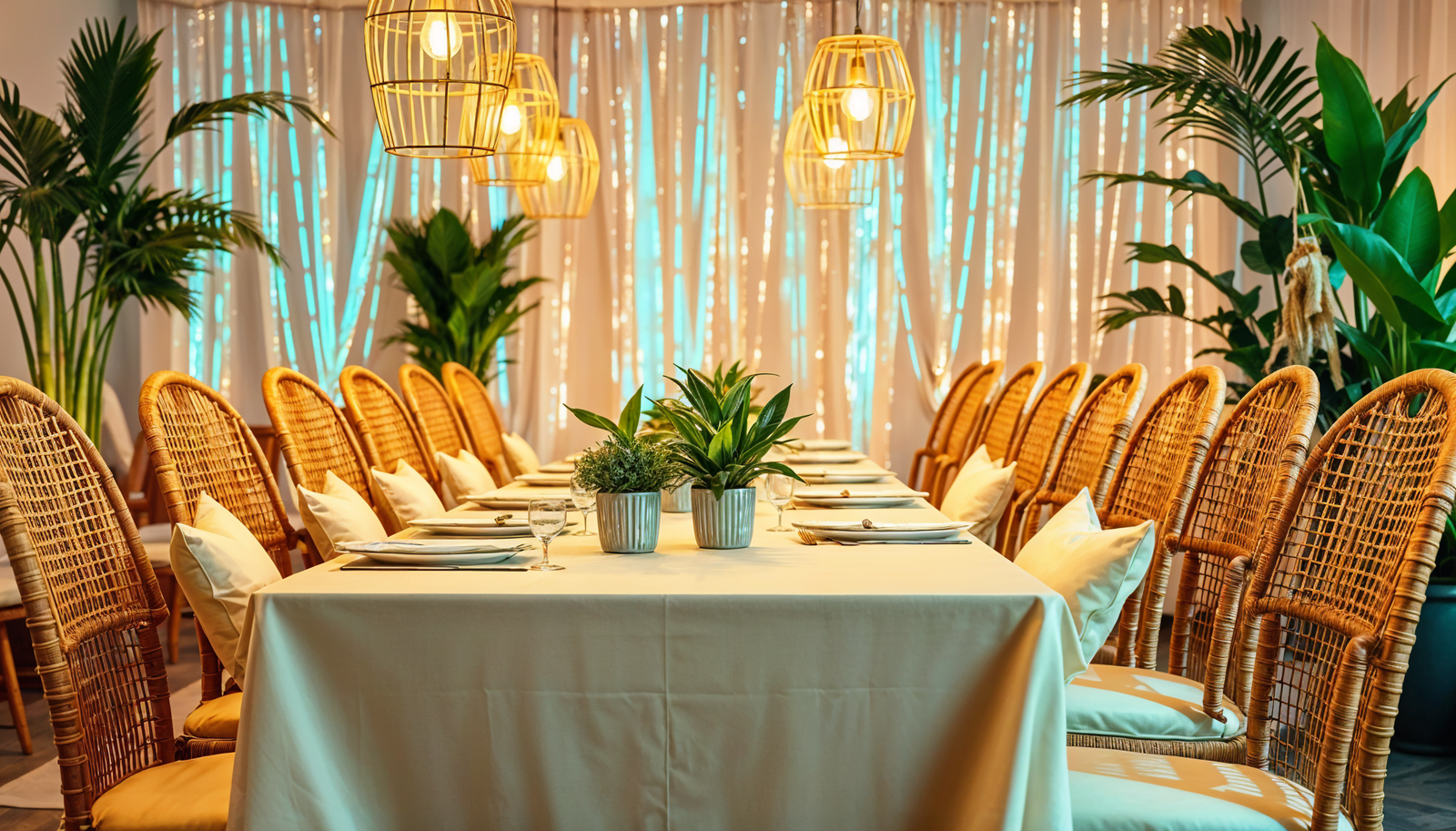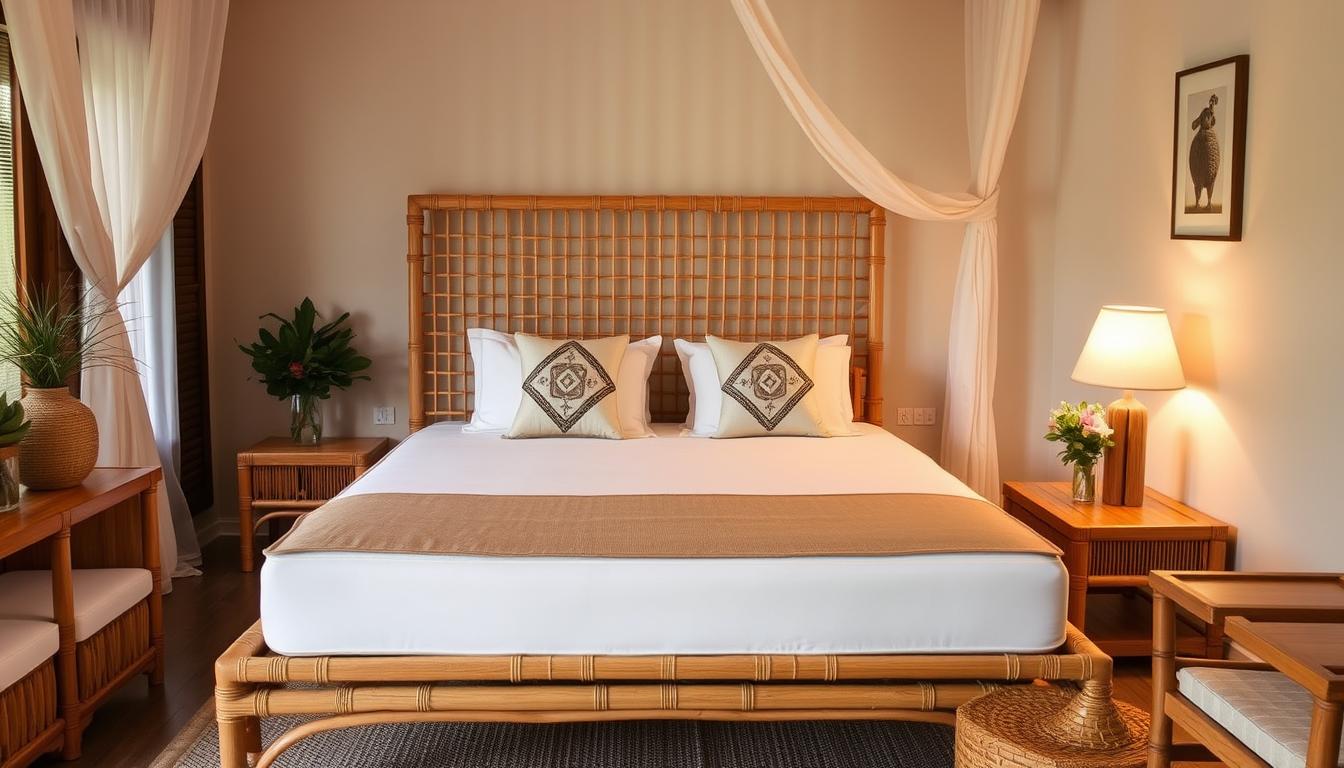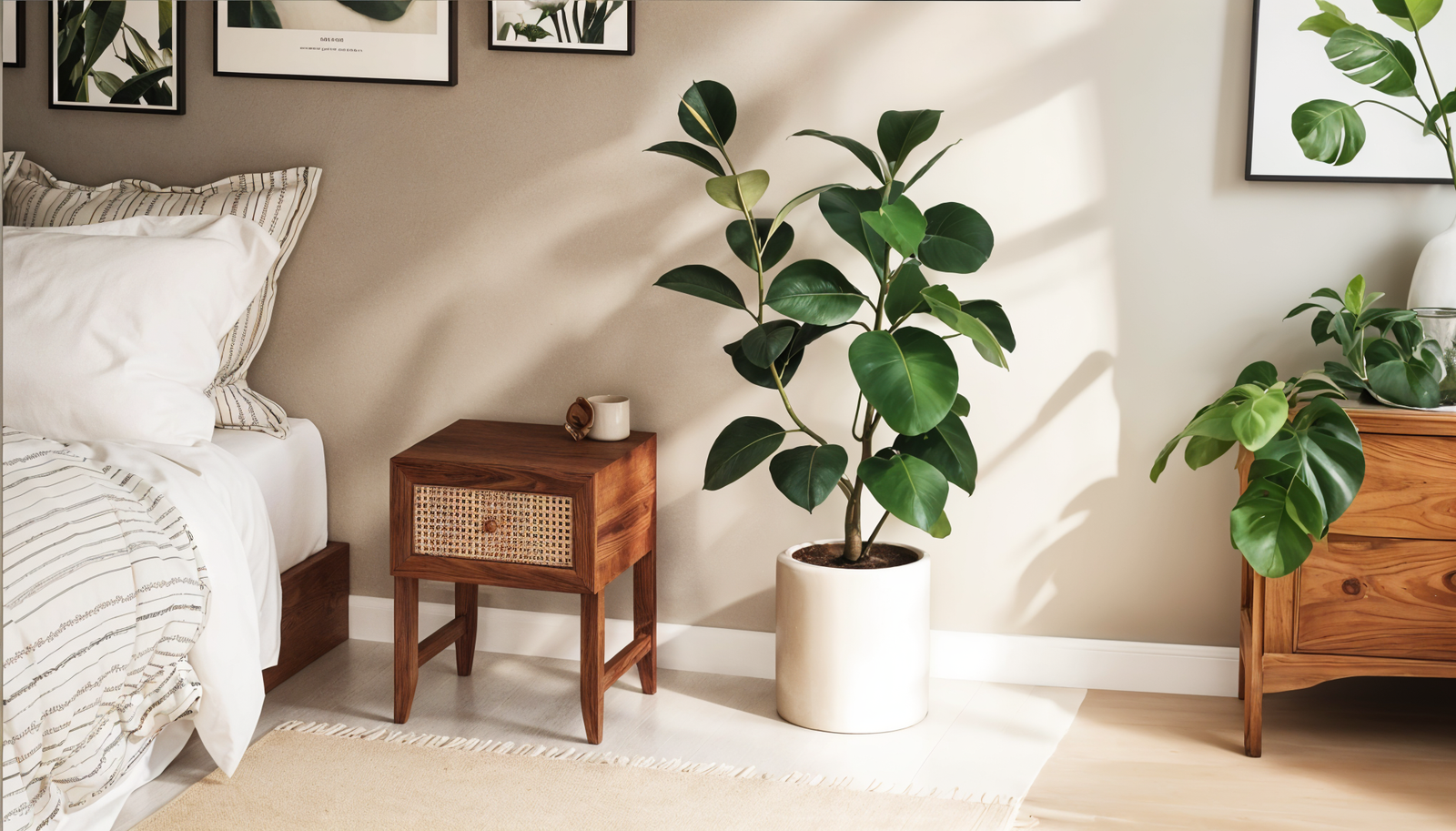🤍 Unmatched Quality, Authentic Craftsmanship
🤍 Unmatched Quality, Authentic Craftsmanship
🤍 Unmatched Quality, Authentic Craftsmanship
Welcome to our guide on Japandi living room ideas!
In this article, we will explore the beautiful Scandinavian-Japanese fusion design aesthetics to create a space that blends style and serenity.
Japandi home inspiration combines the minimalist and functional elements of Scandinavian decor with the simplicity and tranquility of Japanese minimalism.
By incorporating natural materials, clean lines, and modern accents, you can create a living room that exudes a sense of calm and harmony.

With Japandi living room ideas, you can embrace a simple and harmonious living room approach while still adding warmth and character to your space.
By incorporating natural materials such as wood, bamboo, and stone, you can bring a touch of organic beauty and sustainability to your interior.
Add contemporary art pieces and mix old and new elements to create a modern Japandi look that reflects your personal style.
Japandi design is a captivating fusion of Japanese and Scandinavian aesthetics, resulting in a unique and harmonious style.
In this section, we will explore the key elements of Japandi design, which encompass the use of natural materials, clean lines, functional design, and minimalist decor.
By understanding these foundational aspects, we can create a serene and balanced living space that embodies the essence of Japandi.
The Japandi aesthetic is characterized by a thoughtful integration of elements from both Japanese and Scandinavian cultures.
Let's delve into the key elements that define this design style:
The fusion of these key elements produces a design style that transcends cultural boundaries, creating a space that feels simultaneously approachable and refined.
Let's now explore how these elements come together to shape Japandi living spaces.
Japandi living spaces are renowned for their unique blend of minimalism and cozy, serene atmosphere.
The design principles of Japandi emphasize the use of neutral color palettes, natural materials, and clean lines to create harmonious living environments.
These characteristics contribute to a sense of mindfulness and relaxation in the home.
To achieve the minimalist living style of Japandi, neutral color palettes are commonly employed.
Soft hues such as whites, grays, and earthy tones dominate the space, creating a calming and tranquil atmosphere.
This color scheme helps to declutter the visual environment, promoting a sense of openness and serenity.
Natural materials in japandi interiors play a significant role. Wood, bamboo, and stone are often incorporated into furniture, flooring, and decor elements.
These organic materials bring a sense of warmth, authenticity, and a connection to nature, further enhancing the cozy ambiance of the living space.
Clean lines are another essential characteristic of serene Japandi living spaces.
Furniture and architectural elements feature simple and uncluttered designs with a focus on functionality and minimal ornamentation.
This emphasis on clean lines creates a sense of order and visual balance, contributing to the serene atmosphere of the room.
Serene Japandi living spaces also prioritize the creation of a cozy and inviting atmosphere.
Soft textiles, such as cushions, throws, and rugs, add warmth and comfort to the room. These cozy accents, along with the natural materials and minimalist design, create a welcoming and tranquil environment that promotes relaxation and well-being.
| Characteristics | Description |
|---|---|
| Neutral Color Palettes | Soft hues, whites, grays, and earthy tones create a calming and decluttered environment. |
| Natural Materials | Wood, bamboo, and stone bring warmth, authenticity, and a connection to nature. |
| Clean Lines | Furniture and architectural elements feature simple and uncluttered designs, promoting visual balance. |
| Cozy Accents | Soft textiles, like cushions and throws, add warmth and comfort to the living space. |
A cohesive color palette is essential in Japandi design.
To achieve a harmonious and balanced look in your living room, it is important to select colors that complement each other and create a sense of unity throughout the space.
One effective approach is to start with neutral shades as the foundation of your color palette.
Neutral shades such as white, beige, gray, and taupe create a calm and serene atmosphere.
These colors provide a versatile backdrop that allows other elements of the room to stand out.
Incorporating accents in Japandi interiors can add depth and visual interest to the space.
Consider adding pops of color through decorative accessories, such as throw pillows, artwork, or rugs.
These accents can be in muted earthy tones like soft greens, warm browns, or natural blues, which complement the neutral shades and bring a sense of warmth and depth to the room.

Neutral shades are the cornerstone of Japandi interiors.
They create a clean and minimalist backdrop that allows the natural materials and functional design to take center stage.
These shades also have a calming effect, promoting a sense of tranquility and serenity in the room.
When choosing neutral shades for your living room, opt for soft whites, warm grays, and earthy beiges.
These colors bring a timeless and sophisticated look to the space while also providing a versatile canvas for other design elements.
Accents in Japandi interiors play a crucial role in adding visual interest and personality to the room.
Consider incorporating accent colors through textiles, such as cushions, throws, or curtains.
These accents can be in muted earthy tones or even subtle pastels, creating a sense of warmth and harmony within the space.
Integrating earthy tones into your Japandi living room can add warmth and depth to the overall design.
Earthy tones, such as warm browns, soft greens, or natural blues, evoke a sense of nature and tranquility.
These colors create a welcoming atmosphere and help establish a connection to the natural world.
One way to incorporate earthy tones is through furniture and decor choices.
Consider selecting pieces made from natural materials, such as wood or rattan, in warm, earthy hues.
Additionally, adding natural elements like plants or stones can further enhance the earthy vibe of the room.
By creating a cohesive color palette that combines neutral shades with accents in Japandi interiors and integrating earthy tones, you can achieve a living room that exudes warmth, depth, and a sense of tranquility.
Japandi design values furniture that is not only visually appealing but also highly functional.
The selection of furniture for your living room plays a crucial role in achieving the Japandi aesthetic.
It should embody the perfect balance between form and function, seamlessly blending into the overall design scheme.
When choosing Japandi furniture, prioritize minimalist designs that exude simplicity and clean lines.
Opt for pieces that serve multiple purposes to maximize their functionality, such as storage ottomans or coffee tables with built-in shelves.
This will help create a clutter-free and well-organized space, characteristic of Japandi interiors.
Additionally, consider natural materials like wood, bamboo, or rattan for furniture pieces, as they align with the sustainable and organic aspects of Japandi design.
These materials not only add warmth and texture but also contribute to the overall serenity of the living room.
When it comes to Japandi design, minimalist living room decor is essential to creating a serene and harmonious space.
The key is to select decor items that are simple yet impactful, adding style and personality to your living room without cluttering the space.
Start by choosing decor pieces that align with the clean lines and simplicity of Japandi aesthetics.
Opt for items with minimalist designs, such as sleek vases, geometric sculptures, or abstract artwork.
These simple yet striking pieces will make a statement without overwhelming the room.
To maintain clarity and openness in your Japandi-inspired living room, focus on decluttering and organizing your space.
Embrace the less-is-more philosophy by keeping only the essential decor items and removing any unnecessary clutter.
Consider incorporating storage solutions that blend seamlessly with your minimalist decor.
Opt for open shelving or sleek cabinets that can hide away any items that might disrupt the overall clarity of the room.
This will help create a sense of visual harmony and order.
When selecting decor items, choose pieces that promote a sense of openness.
Light-colored furniture, minimalistic bookshelves, and strategically placed mirrors can enhance the perception of space and create an airy atmosphere in your living room.
Natural materials are a fundamental element of Japandi design, contributing to the overall aesthetic and ambiance of a living room.
Incorporating materials such as wood, bamboo, and stone enhances the organic beauty and sustainability of the space, allowing for a harmonious blend of nature and minimalism.
In Japandi living rooms, wood is often used for furniture, flooring, and accent pieces.
Its warm tones and natural grain create a sense of warmth and serenity. Bamboo, on the other hand, adds a touch of elegance and versatility.
It can be incorporated through furniture, window treatments, or even decorative elements.

Stone, whether it's in the form of a statement wall, fireplace surround, or decorative objects, adds a grounding element to the space.
It complements the natural color palette and reinforces the connection to the earth.
By using these natural materials, Japandi living rooms promote sustainability and a connection with nature, allowing for a serene and eco-friendly living environment.
The combination of organic beauty and sustainability creates a space that not only looks beautiful but also aligns with a conscious and mindful lifestyle.
Modern decor accents are an excellent way to infuse contemporary style into Japandi living rooms.
By incorporating elements of contemporary art and mixing old and new pieces, you can create a Japandi look that is both timeless and on-trend.
These decor accents complement the minimalist and functional design principles of Japandi while adding a touch of modernity and individuality to your space.
One way to introduce modern Japandi decor accents is by incorporating contemporary art into your living room.
Choose artwork that features clean lines, simple forms, and neutral color palettes to align with the minimalist aesthetics of Japandi design.
Whether it's a striking painting, a sculptural piece, or a thought-provoking photograph, contemporary art can act as a focal point and add visual interest to your space.
To achieve a Japandi look, consider mixing old and new elements in your living room.
This blending of traditional and modern styles not only adds character but also creates a balanced and eclectic atmosphere.
Incorporate vintage furniture pieces, such as a mid-century modern armchair or a retro side table, alongside contemporary pieces with clean lines and minimalist aesthetics.
This juxtaposition of old and new creates a unique and inviting space that reflects the Japandi design ethos.
Incorporating serene Japandi touches is a key element in creating a relaxing and peaceful atmosphere in your living room.
By carefully selecting the right accessories, you can enhance the serene ambiance and bring a touch of tranquility to your space.
To design a relaxing and peaceful atmosphere, focus on using natural elements and minimalist aesthetics.
Incorporate elements such as bamboo accents, Japanese-inspired ceramics, and Scandinavian-style textiles.
These serene Japandi touches will create a harmonious blend of cultures and bring a sense of calm to your living room.
The furniture arrangement in your living room can greatly impact the overall serenity and harmony of the space.
Opt for a layout that promotes a sense of openness and allows for easy movement.
Consider choosing furniture pieces that have clean lines and a minimalist design, ensuring they blend seamlessly with the Japandi aesthetic.
By arranging your furniture in an optimal way, you can create a serene and relaxing environment for you and your guests to enjoy.
| Accessories | Benefits |
|---|---|
| Natural bamboo accents | Adds a touch of organic beauty |
| Japanese-inspired ceramics | Brings tranquility and a sense of tradition |
| Scandinavian-style textiles | Adds warmth and coziness |
When it comes to Japandi interiors, lighting is a crucial element that sets the ambiance and enhances the overall mood of the space.
In this section, we will explore various lighting techniques commonly used in Japandi living rooms to create a serene and tranquil atmosphere.
One of the key techniques is maximizing natural light. Japandi design embraces the use of large windows and open spaces to allow ample natural light to fill the room.
This not only creates a sense of openness and connection with the outdoors but also enhances the natural beauty of the space.
To highlight this technique, here's a visually appealing image:
Additionally, soft lighting is another important aspect of Japandi interiors.
Soft lighting fixtures, such as pendant lights or table lamps with warm-toned bulbs, create a cozy and relaxed atmosphere.
These gentle and diffused light sources help to reduce glare and create a soothing ambiance in the living room.
Pairing soft lighting with natural light can further elevate the serenity and tranquility of the space.
By incorporating these lighting techniques into Japandi interiors, you can create a harmonious living room that embraces the essence of Japanese minimalism and Scandinavian simplicity.
Japandi textiles are a wonderful way to elevate the look and feel of your living room.
With their combination of comfort, style, and attention to detail, these textiles can truly transform your space.
In this section, we will explore how to enhance your living room with Japandi textiles by choosing comfortable and stylish fabrics.
We will also discuss the art of layering textures to create a luxe feel and enhance the overall aesthetic of the room.
When selecting Japandi textiles for your living room, it's important to prioritize both comfort and style.
Look for fabrics that not only feel soft and cozy but also add visual interest to your space.
Consider options like plush velvet or soft linen that provide a comfortable place to relax while also adding a touch of luxury.
Additionally, pay attention to the color and pattern of the fabrics.
Opt for neutral tones or subtle patterns that complement your existing decor and create a cohesive look.
This will help to maintain the serene and balanced atmosphere characteristic of Japandi home inspiration.
One of the key techniques for enhancing your space with Japandi textiles is layering textures.
This adds depth and richness to the room, creating a luxurious and inviting atmosphere.
Start by layering different fabrics, such as adding a cozy throw blanket or cushions in contrasting textures.
You can also incorporate different textures through rugs or curtains.
A woven jute rug or a sheer linen curtain can introduce organic textures that complement the natural materials commonly found in scandinavian-japanese fusion design.
These layers of texture create visual interest and a sense of warmth in your living room.
By choosing comfortable and stylish fabrics and layering textures, you can create a simple and harmonious living room that exudes a luxe feel and embodies the essence of Japandi design.
These textiles not only enhance the visual appeal of the space but also provide a cozy and inviting environment for you and your guests to enjoy.
Now that you have read the above article, maybe you still have a couple of questions on this topic, so we will answer these questions below.
Japandi living spaces are known for their minimalist yet cozy and serene atmosphere, featuring neutral color palettes, natural materials, and clean lines.
When selecting furniture for a Japandi living room, prioritize functional pieces that are aesthetically pleasing, such as minimalist furniture that harmonizes with the overall design aesthetic.
Yes, you can incorporate modern Japandi decor accents by using contemporary art and a mix of old and new elements to enhance the overall aesthetic of the space.
To enhance your living room with Japandi textiles, choose comfortable and stylish fabrics and consider layering textures to create a luxurious feel and enhance the overall aesthetic of the room.
In conclusion, Japandi living room ideas offer a unique blend of style and serenity, creating a harmonious space that promotes a balanced and tranquil lifestyle.
Throughout this article, we explored various aspects of Japandi design, including the fusion of Japanese and Scandinavian aesthetics, the key elements of Japandi decor, and the characteristics of Japandi living spaces.
Implementing a cohesive color palette, selecting Japandi furniture that combines form and function, and accessorizing with serene touches are all key elements in creating a harmonious Japandi-inspired living room.
Additionally, paying attention to lighting techniques, incorporating Japandi textiles, and maintaining optimal furniture arrangements will further enhance the serenity and tranquility of your space.
By following these Japandi living room ideas, you can transform your space into a haven of serenity where style and peacefulness coexist.
Embrace the minimalist mindset, surround yourself with natural materials and functional furniture, and create a space that promotes a balanced and harmonious lifestyle.


